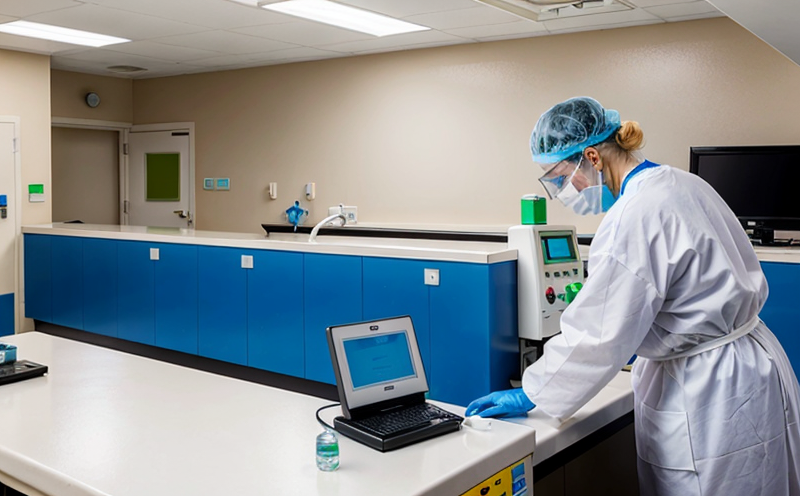Alcohol-Based Hand Sanitizer Efficacy Testing in Hospitals
The efficacy of alcohol-based hand sanitizers (ABHS) is critical to maintaining hospital hygiene and preventing the spread of infectious diseases. In healthcare settings, ABHS are often used as an alternative to or supplement for hand washing with water. This service ensures that the products meet stringent standards and provide reliable performance.
Our testing focuses on the following parameters:
- Ethanol concentration
- Bacillus atrophaeus spore killing activity
- Coliform reduction capability
- Skin irritation potential
The test procedure involves inoculating Bacillus atrophaeus spores onto agar plates, applying the sanitizer, and incubating the plates. The efficacy is determined by comparing the growth of the spores before and after application.
For coliform reduction capability testing, a suspension of coliform bacteria is prepared and exposed to the sanitizing agent under specified conditions. After exposure, the sample is plated on selective media, and the reduction in bacterial count is calculated.
Skin irritation potential tests involve applying the sanitizer to human skin samples and assessing for any adverse reactions or irritations after a set period of time.
| Parameter | Methodology | Standard |
|---|---|---|
| Ethanol concentration | Determination by gas chromatography | ASTM D4816 |
| Bacillus atrophaeus spore killing activity | Agar plate method with incubation | ISO 17690:2013 |
| Coliform reduction capability | Plating on selective media and counting colonies | ASTM E2585-18 |
| Skin irritation potential | Evaluation of skin reactions post-application | IEC 60312:2017 |
Accurate and reliable testing is crucial for ensuring that ABHS meet regulatory requirements and provide effective hygiene solutions. Our laboratory adheres to international standards such as ISO, ASTM, EN, and IEC to ensure consistency and accuracy in our results.
Benefits
The benefits of alcohol-based hand sanitizer efficacy testing are multifaceted:
Ensures compliance with regulatory standards such as FDA, WHO, and national guidelines
Guarantees consistent product performance across batches
Reduces the risk of healthcare-associated infections (HAIs)
Informs formulation adjustments for enhanced efficacy
Facilitates market entry and regulatory approvals in multiple countries
Improves patient safety by minimizing cross-contamination risks
By partnering with our laboratory, clients gain access to expert testing services that are essential for maintaining high standards of hygiene in hospital settings.
Industry Applications
| Application | Description |
|---|---|
| Hospital Hygiene | Evaluating the effectiveness of ABHS in reducing pathogens on surfaces and hands. |
| Retail & Commercial Disinfectants | Assessing the suitability of ABHS for use by the general public in high-touch environments. |
| Long-Term Care Facilities | Determining the performance of ABHS in maintaining hygiene levels among vulnerable populations. |
| In-Home Use | Testing the efficacy for use by individuals and families to enhance personal hygiene practices. |
The testing is particularly important in hospital environments where hand hygiene compliance can significantly impact patient outcomes. Our tests are designed to simulate real-world conditions, ensuring that products perform reliably under varied environmental factors.
Use Cases and Application Examples
| Use Case | Example |
|---|---|
| New Product Development | Testing a new formulation of ABHS to ensure it meets all regulatory requirements. |
| Quality Control | Performing regular batch testing to verify that each production run meets the expected efficacy standards. |
| Research & Development | Comparing different alcohol concentrations and formulations for optimal performance. |
| Regulatory Compliance | Ensuring compliance with international hygiene guidelines such as WHO recommendations. |
In addition to these use cases, our testing can also support the development of new disinfectant products that are specifically tailored for hospital environments. This includes evaluating the product's ability to inactivate specific pathogens and its compatibility with various surfaces within a healthcare setting.





